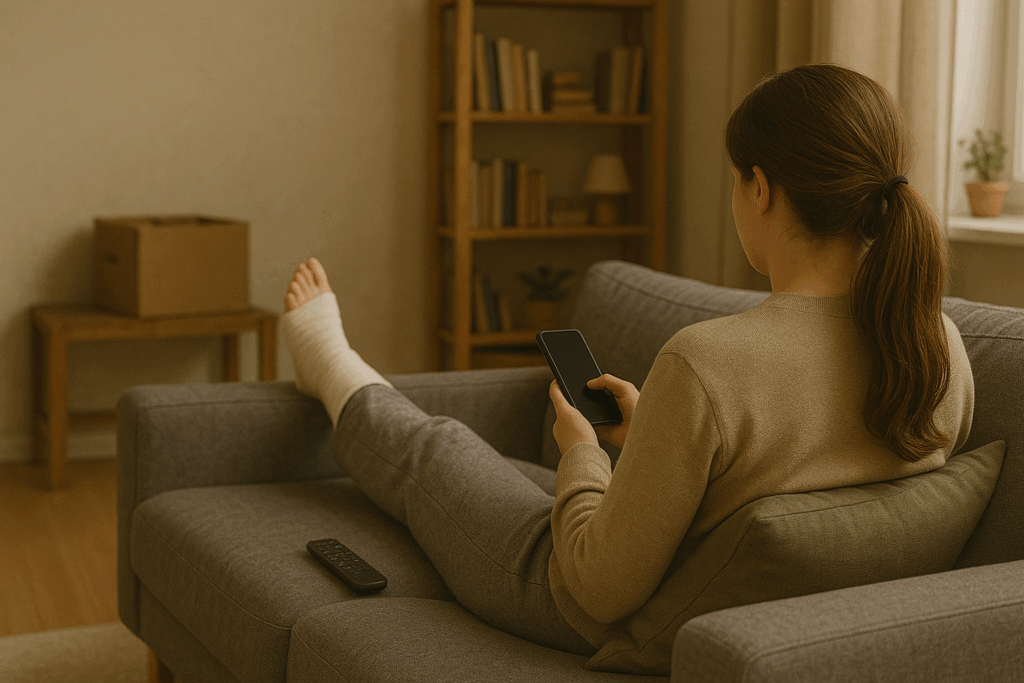I recently spent the better part of a week couch-bound after a minor procedure on my foot. Nothing dramatic—just a few days on crutches and the inability to lower my leg below the altitude of my heart without pain, which meant I’ve spent a lot of time working my way through my ‘to watch’ list.
Now that I’m slowly moving again, I’ve been reminded how quickly our capacity to declutter, organise, or even think clearly can just vanish.
Whether you’re decluttering with chronic illness or ADHD, managing burnout, executive dysfunction, or a low-energy week brought on by life just being a lot—decluttering can feel wildly out of reach.
And here’s the kicker: when you’re physically injured, people expect you to rest. But if you’re dealing with ADHD, trauma, or mental health issues, you’re more likely to be told to “push through.”
Let’s not do that anymore.
Here are four neurodivergent-friendly decluttering tips for those days when even lifting a laundry basket feels like climbing a mountain.

Tip 1: Declutter for Your Now Self
You are not lazy for letting the pasta maker, the Pilates gear, or the pile of unread books gather dust. These things might belong to your ideal self—the version of you with time, energy, focus, and a pain-free body.
But your now self needs breathing room, not reminders of unfinished business.
Ask: “Is this supporting my life as it is right now—or is it just making me feel worse?”
Let go of the clutter that’s based on guilt or fantasy. Keep what helps you live your current, beautiful, messy, real life.
Tip 2: Keep It Short and Soulful
Forget the deep clean. Try the low-energy tidying strategy of short, powerful sessions. One shelf. One drawer. One basket.
Time your task to one song—preferably something that makes you feel strong and seen. I recommend Adele, Kelly Clarkson, Pink, or Beyoncé. Channel your inner powerhouse, even if you’re in bed socks and a heat pack.
Microbursts work with your brain, especially if you have ADHD. They give you that sweet hit of dopamine and accomplishment without the overwhelm of “I have to do it all.”
Tip 3: Declutter From Your Comfort Zone
Here’s one of my favourite realistic decluttering methods: If you can’t go to the clutter, bring the clutter to you.
Drag over a D.O.O.M. pile (that’s “Didn’t Organise, Only Moved”) or scoop up a basket of random stuff and plonk it next to your couch, bed, or nesting zone. Sort through it slowly, when you can. No rush. No shame.
Too drained for that? Try decluttering your phone. Clear out your inbox, delete blurry photos, and unfollow accounts that drain you. You’re on your phone anyway—may as well trade that scroll for a little hit of happy chemicals (dopamine, serotonin, endorphins, oxytocin… and yep, reduced cortisol too). This is what *I* was doing because even sitting up was too much for a few days – phone to face was about as much as I could manage.
It’s way more satisfying than telling Netflix, “Yes, I’m still watching.”
Tip 4: Don’t Do It Alone (Even If You’re Alone)
Whether you’re dealing with executive dysfunction and clutter, neurodivergent burnout, or just zero motivation—you don’t have to white-knuckle through it solo.
Try body doubling: sit with a friend (virtually or IRL), join a live Zoom clean-along, or come hang out in one of my Side-by-Side Sessions. You don’t even have to talk. Just knowing someone else is also decluttering makes a huge difference.
If human contact feels like too much, a YouTube clean-along or lo-fi background video can give you that “I’m not alone” feeling without interaction.
You Deserve Space That Supports You—Exactly As You Are
Some seasons are just hard. Injury. Fatigue. Recovery. Neurodivergent overwhelm. They all mess with your ability to “keep up.”
But you’re not falling behind. You’re adapting. Healing. Resting.
Your home should support your life—not shame you for it. So be gentle. Start small. And when you’re ready, I’m here to help you D.C.L.T.R. in a way that actually fits you.
💬 Ready for gentle support and judgment-free structure?
Join The Simplicity Toolkit for flexible prompts, real-time accountability, and a private community where you can make progress—your way.
👉 Join Now »
